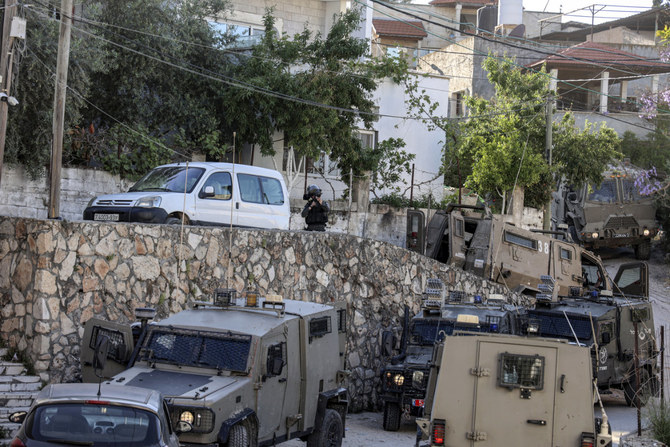How Palestine drives Israel’s lucrative weapons industry

https://arab.news/94fwv
As with any Israeli operation in the West Bank, there are several ways to understand the recent events in Jenin. Israel’s explanation for its assault on the Palestinian refugee camp — which killed 12 Palestinians, injured 140 and forced thousands to flee — was to curb the rise of Palestinian resistance in the northern West Bank. A recent spike in Palestinian attacks on the Israeli military and civilians has dominated the news. However, Israel’s explanation never acknowledges the constant aggression that comes with a full-blown military occupation. The maintenance and expansion of Israel’s occupation is a primary motivation for Israel’s recent actions in Jenin.
It is also vital to view the recent Jenin operation from the political standpoint of Israel’s hard-right government. The spike in violence between Israelis and Palestinians — the Israeli military has killed 114 Palestinians this year and Palestinians have killed 16 Israelis — has given Israel’s extremist politicians a platform to incite hatred and encourage a deepening of the country’s footprint in Palestinian areas.
National Security Minister Itamar Ben-Gvir, who has been convicted of incitement to racism, responded to one recent attack on Israeli settlers with calls for “a military operation to demolish buildings, eliminate terrorists, not one or two, but tens and hundreds, and if necessary even thousands.” Other politicians have called for increased Israeli settlement creation in response to the wave of violence sweeping the territory. There are open discussions in Israel and Palestine that large-scale Palestinian expulsions from the West Bank could be on the cards in the not-too-distant future.
Palestinians see the Jenin operation as a serious attempt to destabilize Palestinian life. Institutions such as the Palestinian Authority have proven completely unable to stand up for Palestinian rights and dignity in the face of continuous Israeli assaults and land grabs. At this point, the two-state solution as envisioned in the Oslo Accords is a faint memory, let alone a viable plan for the future.
While the spike in violence between the two sides is undeniable, it is a symptom of a deeper issue. The occupation of Palestine is the most-funded and resourced state project in Israel’s history. On the surface, the occupation has been sold as a temporary defensive measure necessary for Israel’s survival. However, it satisfies many other needs. Given the biblical connection to the West Bank, the occupation provides a religious veneer to the project of secular Zionism. Control over holy cities with deep meaning in Jewish religious history rallies Jews worldwide to support Israel and its government.
While the spike in violence between the two sides is undeniable, it is a symptom of a deeper issue
Joseph Dana
More importantly, Israel’s military control over an entire population has facilitated the creation of a lucrative weapons industry. In his new book, “The Palestine Laboratory: How Israel Exports the Technology of Occupation Around the World,” the Australian journalist Antony Loewenstein has documented the intricate connection between the occupation of Palestine and the development of the modern weapons industry. Controlling millions of people requires more than a strong military. Israel has dominated virtually all aspects of Palestinian life, with remarkable efficiency, through a matrix of checkpoints, physical barriers and advanced surveillance technologies.
The systems Israel has designed, developed and tested have become lucrative goods for export to some of the world’s most repressive regimes. While many have heard about Israel’s NSO Group and its phone-hacking technology, fewer know how deep Israel’s history of exporting weapons technologies goes. From Pinochet’s Chile to apartheid South Africa, Israel has used the knowledge and systems it procures in its control over Palestinians to establish lucrative trade and political ties around the world.
Israel’s drone program, which has brought billions of dollars into the country, is one of the best in the world. Loewenstein notes it has become so good because the Israeli military has a captive population in the West Bank and Gaza that it can fly drones over and test various technologies. Tested weapons and surveillance technology are generally considered the best, and Israel can test its wares 24 hours a day on the Palestinian population.
If the occupation were to end tomorrow and a two-state solution took hold of the land between the Jordan River and the Mediterranean Sea, Israel would lose its technology laboratory. The Israeli weapons industry, just like apartheid South Africa’s weapons industry, would wither into a shadow of its former self. Since many of Israel’s vaunted technology entrepreneurs started in elite military units, the country’s mainstream technology sector would also take a hit. Where would they test their crafts and new ideas? From this perspective, Israel has a significant economic interest in entrenching its occupation of Palestine. Thus, political posturing is a distraction drumbeat to keep the population invested in this resource-intense state project.
The recent Jenin operation looks different when considering Palestine as a weapons laboratory. While the cycle of violence might be spiking, the Israeli army decided to test out new tools and strategies in Jenin last week. What they learned from the operation will go into new surveillance and control technologies that will eventually find their way around the world. If you want to find a reason for the assault on Jenin or the continuation of Israel’s occupation, follow the weapons technology.
• Joseph Dana is a writer based in South Africa and the Middle East. He has reported from Jerusalem, Ramallah, Cairo, Istanbul, and Abu Dhabi. He was formerly editor-in-chief of emerge85, a media project based in Abu Dhabi exploring change in emerging markets. Copyright: Syndication Bureau









































